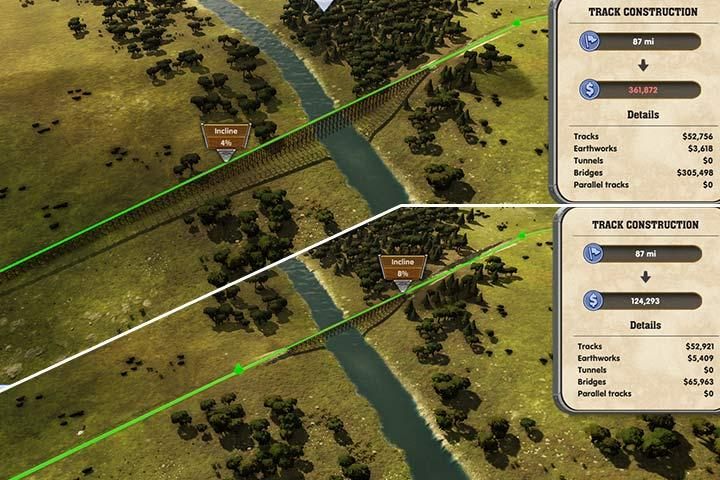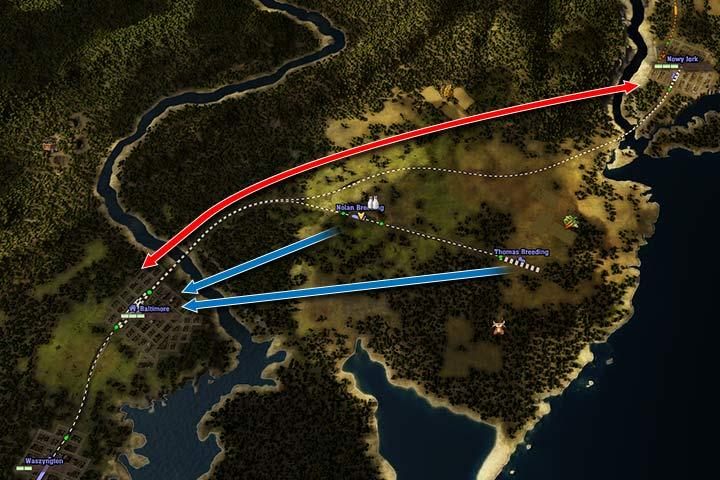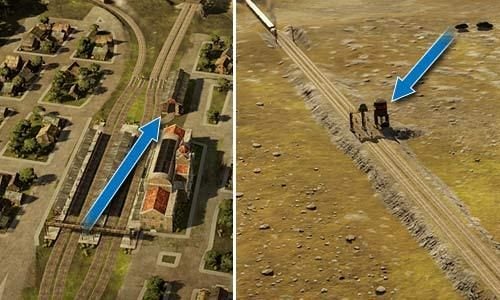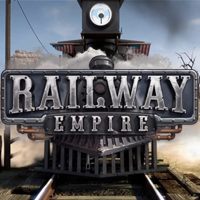Railway Empire: Useful hints to make a good start
Last update:
Here youy'll find a useful tips to make your first steps in Railway Empire.
- One step at a time
- How to build stops and lay down tracks
- Railway lines and transport
- Difficulty level, research and personnel
One step at a time
It's best to start off with the express delivery of cargo between cities, preferably big ones, which makes it easier to get a larger number of passengers and more mail. Find out between which cities people travel the most (city details in the window on the right). After that, find out what factories there are in the city and what materials they need. Build a line to nearby factories. This way, you will master the method of building connections and you will not pay a fortune to lay down tracks. Income from transporting passengers is higher, if only you transport them fast and comfortably. On the other hand, cargo transport is not dependent on speed or other factors. Simply, you have to deliver it to a factory or a city.
How to build stops and lay down tracks
Remember that bigger stations not only have more platforms, but also greater reach of materials from manufacturers. This way, you will be able to take on more passengers and receive materials from two factories. At the beginning, this is very helpful, as it makes for establishing fewer connections. Also, it will be easier for you to obtain materials from your competitor's area. Building a station in a city doesn't decrease its population. The layout of streets and houses will be re-planned, so you don't have to bear any additional costs because you built a station.

- It may be very expensive to lay down tracks, and especially long lines. Therefore, set additional nodes to decrease your costs. At first, avoid bridges and tunnels. They are really expensive and, by using embankments and flat areas, you can save several-fold.
- It may be very costly to lay down tracks, and especially long lines. Therefore, set additional nodes to decrease your cost. At first, avoid bridges and tunnels. They are really expensive and, by using embankments and flat areas, you can save several-fold. If, on a given route, the game generates a bridge anyways, simply place a node to place your tracks on the ground, without using bridges.
Railway lines and transport
- The bigger the cities, the more materials and goods they need to progress to the next level. It is a good idea to focus on the development of a single city and expand your railway lines there. Take interest in the transportation of cargo and passengers and deliver goods from other cities.
- You can still deliver goods to cities, even though your trains do not supply factories. There is the classic land transport in the game, which delivers some goods in small quantities. If you want to deliver goods on a larger scale, you have to ensure an additional connection that will operate factories too.

- A good idea is to establish a line focused on passenger transport only, and later add separate ones that deliver cargo. This way, passenger trains will not be delayed by heavy cargo rail cars, and you can provide the remaining trains with powerful railway engines. These will handle cargo trains better, although slower and less comfortable.
- The fastest trains are called the express trains, thanks to which they generate additional income. They are the fastest available trains which cover distances between cities in the shortest time possible. Also, make sure that your connections are as flat as possible, without additional trains and provide them with fast, comfortable locomotives (as an option, add personnel to such trains).

- On each connection between cities, build supply stations! Without them, your trains will slow down quickly and you will lose money on additional repairs. Service buildings can only be built at stations. They are quite expensive, so place them at high-traffic stations, e.g. a city that you have built several connections to. With time, your railway engines will not require repairs, and if they cannot be maintained in such buildings, their susceptibility to damage will get higher.
- Accidents never happen! All of the railway engines in the game are manned with intelligent machinists and probability of accidents never occurs. Trains don't fall out of the tracks, signaling doesn't allow several trains to pull in on a single track and the game disallows connections that would lead to an accident.
- You cannot demolish lines that are currently operated. If you want to do this, you first have to provide an alternative route for the train.
Difficulty level, research and personnel
- What makes the easy difficulty stand out is the model of establishing connections. In this mode, trains go through each other without colliding, so there is no need to establish extensive connections with signaling equipment, etc. The realistic mode is quite challenging and tends to be problematic for inexperienced players.
- Computer AI always operates in the easy mode, but developers confirm that costs of new structures and trains are higher for it and it takes more time to make a take a decision. This is designed to balance out the relatively simple connections that it establishes.
- Research is essential, not only from the perspective of progress, but also to succeed in every scenario. There are two types of research; new types of trains, and upgrades for the existing branches of your business. In missions, where you start off at a relatively early stage of development, it is better to focus on a new railway engines that ensure higher speeds. Usually, upgrades either reduce costs or boost income, which will come in handy, when your network is well-developed.

- Some types of research (or factories) will be put out on the auction, which may also be quite useful. Instead of spending research points, you can simply buy a new technology and save points for something more useful and, at the same time, unlock new technologies. Sometimes, the opponent wants to fight at the auction, so it's better to have savings higher than fifty thousand. Auctions are completely random, you cannot affect when they appear and what you will auction for. Sometimes, factories and manufactories appear more frequently, if the economy of the market is poor.
- Personnel is a very useful addition to long, or difficult, connections. It can increase your profit on a given line. However, it is not a good idea to hire personnel for each and every train. Not everywhere does it yield the expected results and it only incurs costs. On the other hand, the office staff has a global reach and they're useful to your company. Employees have different traits and characteristics - relations between them translate into better or worse bonuses to their work.
- In some missions, you can buy out your opponent at the very beginning of the game! Take out a loan in bonds and take over your competitor's company. This way, you will ensure yourself with stress-free development. The only problems are caused by stations and connections you will acquire this way. You have to connect them to your own stations to expand your network. Also, you can demolish them, but leave tracks in place - they may have some use later.
You are not permitted to copy any image, text or info from this page. This site is not associated with and/or endorsed by the developers and the publishers. All logos and images are copyrighted by their respective owners.
Copyright © 2000 - 2025 Webedia Polska SA for gamepressure.com, unofficial game guides, walkthroughs, secrets, game tips, maps & strategies for top games.
